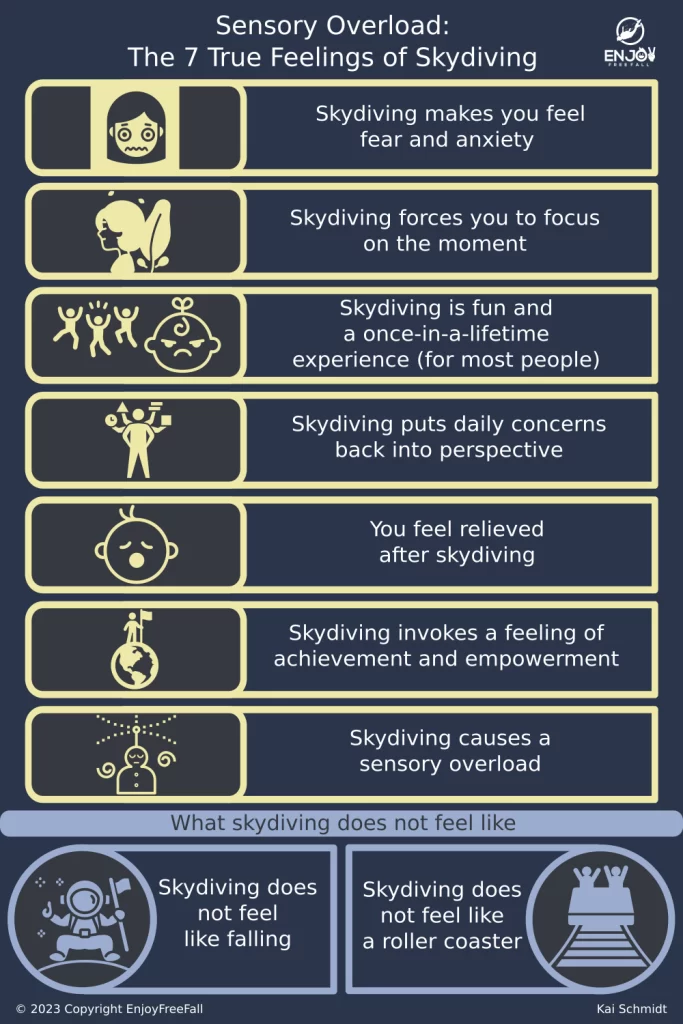
Skydiving is one of the most common boxes that people have on their bucket lists. It is a liberating and scary activity at the same time. Before people decide to take the risk of skydiving, they often wonder what skydiving feels like.
When skydiving, people experience a sensory overload which makes it difficult to describe the experience afterward. Most people feel a mixture of fear, liberation, focus, presence, fun, relief, anxiety, and empowerment.
To fully understand the feelings of skydiving, it is not only important to know what people feel during skydiving but also what they do not feel. Therefore, I also summarized the biggest myths about feelings during skydiving.
Skydiving Is a Mixture of Many Feelings
During skydiving, the human body releases many different hormones to our brain and bloodstream. These hormones will make us feel a variety of feelings in a short time frame.
People Feel Fear and Anxiety When Skydiving
Skydiving is a scary activity where people jump from 15,000 feet out of an airplane and rely on a parachute – basically a piece of specialized nylon – to land safely on the ground. This is a quite scary idea that fills people with anxiety and fear.
This fear usually builds up during the days before the skydive. People are tempted to watch skydiving videos where things did not go well which will make them more nervous. This fear will usually increase on the way to the dropzone and have its first spike when signing the waiver.
The waiver is a legal document that releases legal responsibilities of the skydiving companies in case one gets injuries from the skydive. This is usually the point where people bail out before their skydive. Even though skydiving is extremely safe, signing the waiver makes the risks extremely feasible.
The next spike of fear usually occurs during the plane ride to the sky. People realize then that the skydive is getting real and that they will not be able to bail out anymore. Everyone treats this fear differently and it can be quite interesting to look around during the ascend.
Some people will be extremely quiet while others might talk a lot to cope with their nervousness. I tried to make a few jokes to release my tension – something that the friend I jumped with did not really enjoy.
The hardest part for me personally was when the door opened and people were climbing to the edge of the door. It is then when you realize that you have never been in an airplane with the door open.
Sitting at the edge of the airplane is extremely frightening and your heart will be pumping. Your body will also tense extremely and you wish to be somewhere else. Your body will also release extreme doses of adrenaline – and then you jump.
Skydiving Forces People to Focus on the Moment
When leaving the airplane, the hardest part will be over. There is no way to turn back. During the free fall, people usually lose their feelings for height, time, and speed. They also get caught up in the moment.
Because our bodies are not used to the feeling of freefall, it is a completely new experience for us. Our brains will try to process this new situation and therefore focus fully on what is happening. Consciously, you will just be 100% present in the moment.
When you skydive solo your focus needs to be even higher. Because you are the pilot and not the passenger, you will not think about anything but just react to the environment: stabilize your body position, check the altimeter, check the altimeter again, check it again and deploy the parachute.
Are you curious about how tandem skydiving feels different from solo skydiving? To learn more about the striking differences, check out my article about the 13 differences between tandem and solo skydiving.
The freefall is real and surreal at the same time. In the moment of the freefall, there is only the freefall and what you need to do next. When you look at the freefall afterward, it will feel like watching a movie – everything is so surreal and so far away.
Skydiving Is Fun (For Most People)
Once the parachute is deployed, you will have around 5 minutes of a canopy ride. The canopy ride is one of the most underrated experiences of skydiving. During the ride, your mind will start realizing that it has just jumped out of an airplane.
It is also when most people start feeling relieved. The parachute is deployed and now they are descending at 5 mph down to the earth. They feel safe again. The canopy ride also offers beautiful scenery that most people have not experienced first hand.
If you are looking for great scenery during your canopy ride, make sure to read my article revealing the 15 best and most memorable wingsuit locations worldwide. Even though the article focuses on wingsuit spots, you can often go tandem skydiving there as well!
During tandem jumps the instructor might let you also steer the canopy a bit and will show you a few maneuvers. The maneuvers can be quite fun – but some people also do not like them too much because it makes them feel unsafe again.
Skydiving Puts Daily Concerns Back Into Perspective
Many people also start thinking about their life during the canopy ride. Your body is still pumped with different hormones and you are likely to feel energized because you just survived a risky activity.
For me personally, this is often the time where I start to relax and put my daily stress back into perspective. I often start thinking that it does not matter what stress I experienced at work or in my personal life. The only thing that matters is being there, in the air, at this moment.
I also realize that most of my concerns are unreasonable and should not stress me that much. After all, my life will not deteriorate if a project is going downhill. I will not be a better or worse person because of my work. It does not define me.
People Feel Relieved After Skydiving
Once people land on the ground, they will be energized and will feel strong relief. They have done it, they skydived! This part is a lot of fun. You will start chatting happily with your tandem instructor and other skydivers. If you jumped together with friends, you will high five each other and will be proud of yourselves.
Your body will also release dopamine and endorphin which are also known as the “happy hormones”. People often look at the sky again and realize that they just jumped from there. It is also quite common to revive the jump and your mind will be busy processing your experience.
The feeling of relief and happiness also have tremendous positive impacts on humans’ emotional state. They are known to give people more energy and make them more stress-resilient. Skydiving, in general, has amazing effects on the human body.
If you want to learn about the eleven incredible effects of skydiving on the human body, check out this article.

Skydiving Invokes a Feeling of Achievement and Empowerment
Skydiving is also known to boost people’s self-confidence and sense of achievement. Less than 1% of the global population has skydived. After the skydive, you belong to a very elite group of people that dared the impossible and jumped from 15,000 ft.
You also proved that you can overcome your fears and take action. This reinforcement and confidence are extremely useful in other areas of someone’s life. Directly after the skydive, people often feel invincible. Whatever challenge life throws at them, they know that they are able to overcome it.
If you skydive solo, your sense of achievement and empowerment will even be stronger. You did not only overcome your fears but you also proved that you can work under high pressure – a skill that is needed in many situations in today’s environment.
Skydiving Causes a Sensory Overload
The last impact that you are likely to experience through the complete skydive is a sensory overload. Not only will you experience many different emotions and sensations during your skydive, but you will also do so in a very short time frame.
The constant up and down of different feelings causes your system to be overloaded. Many people also report that they do not remember everything from their first skydive. When watching their skydiving video, they will notice things that they did not remember or did not observe during the skydive.
Feeling a sensory overload is completely common and a good experience. Your mind will take some time to process the skydive and you will constantly think back about this experience. Some people like it that much that they pick skydiving up as a regular hobby.
If you want to know more about the nine advantages of starting skydiving as a hobby, I have written another article about it here.
The sensory overload is often also only experienced by first-time skydivers as they are not used to this kind of experience yet. As a result, a second skydive can feel quite different from the first one.
How Skydiving Does Not Feel
Everyone experiences skydiving a little bit differently. While there are many similarities between what people feel there are also some differences. However, over the cause of the past years, many myths and misconceptions arose about skydiving.
Skydiving Does Not Feel Like Falling
Our body is not used to freefall and people are likely to have not experienced something similar before. After 12 seconds tandem skydivers usually reach terminal velocity i.e. the maximum speed during freefall. Terminal velocity occurs when the air resistance is as strong as the gravitational force that pulls everyone down.
Due to the air resistance, skydiving does not feel like falling. The air resistance forms an “air pillow” below people on which they can float around. Due to this, skydiving does not feel like falling anymore – it feels like flying.
In other words, you are only “falling” for the 12 seconds that you need to reach terminal velocity.
Skydiving Does Not Feel Like a Roller Coaster
Some people compare skydiving to riding a roller coaster, however, nothing could be farther from the truth. A roller coaster often speeds up from 0 mph to 150 mph in a matter of seconds (usually around 3 seconds). Roller coasters, therefore, accelerate three to five times faster than falling.
If you would like to dive deeper into this subject, I have a dedicated article about whether the feelings of skydiving and riding a roller coaster are the same. I also explained which activity is scarier and more dangerous – you’d be surprised by the answers.
As a result, many people will feel a drop in their stomachs when riding a roller coaster whereas skydiving does not invoke such feelings. Another difference is that roller coasters go up and down and change their direction quite frequently. People will be thrown around much more and therefore might feel nausea.
In skydiving, people are also more in control of what is happening. They can maneuver around and lay in the air. In addition, for roller coasters you never really know what will happen next: it might stop, accelerate fast, or might stand still for a minute.
Skydiving is much more predictable in this sense and overall a much more pleasant experience. (I mean pleasant, not necessarily fun – everyone has his own taste of action)
Do You Feel Your Stomach Drop When You Skydive?
Due to the frequent comparison with roller coasters many people often also wonder if they will experience a drop in their stomach when jumping out of the airplane. This rarely happens, however, it is possible.
Specifically, when people suffer from motion sickness, they might experience nausea during the beginning of the freefall where they accelerate until they reach a constant speed (i.e. terminal velocity).
One can reduce this effect if one drinks enough before the jump and eats a little breakfast. When the blood sugar level is higher, people are less likely to feel sick during and after the skydive.
It is also good to tell the instructor before the jump that one has motion sickness. He will then restrain from doing any unnecessary canopy maneuvers in the air and try to make it a smooth and easy ride down.
Do You Pee When Skydiving?
One effect of being nervous is that people feel the need to pee. Skydiving is no exception from this. I, therefore, advise people to go to the bathroom before the jump and before putting on the jumpsuit.
Because skydiving is an exciting activity, people get quite tense. All muscles will tighten and put pressure on the bladder. As a result, the need to pee is even higher during skydiving. That being said, people are not forced to pee and can restrain from doing so.
If you are interested in tips to manage the urge for peeing during your skydive, check out my article “do you need to pee while skydiving”.
Another effect of the tense body muscles is that people feel a higher need to fart. Similar to the need of peeing, people are able to hold it back.
Do Your Ears Pop When Skydiving
The ears do not pop during skydiving. Although the human body will be exposed to strong pressure differences, popping ears is extremely rare. If you have any ear problems, you should nonetheless consult your doctor before making a skydive.
While popping ears do not pose a threat to healthy people, it is more dangerous for people that are sick. If someone is sick, the body might not be able to balance the air pressure difference which can lead to popping ears. As a general rule, if someone feels sick or unwell, he should not jump.
If you want to learn more about the 7 things that can go wrong when skydiving sick, please refer to this article for more information.
How the First Skydive Feels Different to the Following Skydives
The first skydive is often a completely different experience to subsequent skydives. As the body is not yet used to the free fall, the feelings are much more intense. The more jumps people accumulate, the less nervous they become before them.
Although you will always be nervous before a skydive, the level of nervousness drops over time and is replaced by joyful anticipation.
People are also more likely to observe more things after their first skydive. Because everything is new, and the body is pumped with different hormones, first-time skydivers have difficulties processing all their sensations – a feeling that no one will ever forget.
Over time skydiving people also become more experienced in tracking (i.e. moving in the air during free fall) and will start performing maneuvers in freefall and with the canopy. Skydiving, therefore, becomes a hobby and not this amazing one-time experience.
Have you ever wondered how skydivers maneuver their bodies during freefall and safely navigate back to the ground? While it may look effortless, skydiving requires precise control and technique to achieve the desired outcomes. In this blog post, I delve into the different maneuvers skydivers use to control their movements and speed during freefall.
How Solo Skydiving Feels Different From Tandem Skydiving
Solo skydiving is much more intense than tandem skydiving. On a solo skydive, you are the pilot and not the passenger. You will be in charge of the jump and you are responsible for getting down safely.
People still experience similar feelings when skydiving solo and tandem. However, skydiving solo is 10 times more intense. First-time solo skydivers are much more nervous and anxious before their skydive than tandem students.
Even though many first-time skydivers will already have performed a tandem skydive before jumping solo and should know what to expect, it is a different experience.
First-time solo skydivers also need to have a much stronger focus during freefall and will have a higher sense of achievement after the landing than tandem skydivers. With increasing experience and routine, feelings will become less intense and will be replaced by joyful anticipation.
What Happens to Your Body When You Skydive?
Skydiving also has multiple effects on the human body. Skydiving is not only physically but also mentally and emotionally exhausting. During the skydive, the body releases different hormones to the bloodstream including adrenaline, cortisol, dopamine, and endorphins.
Overall, skydiving is known to have positive impacts on the human body and mind. Regular skydivers are usually more resilient to stress and can perform under pressure. They will also benefit from increased physical fitness.
Skydiving has different short-term and long-term effects on the human body. If you want to learn more about them, you can find more information here.
Should You Go Skydive?
This is a highly personalized question. For me personally, skydiving has had tremendous positive effects on my life and I am extremely happy to have tried it. So far, I have also not met a single person that regretted doing it.
That being said, I hope you dare to skydive soon.
Enjoy your freefall!




